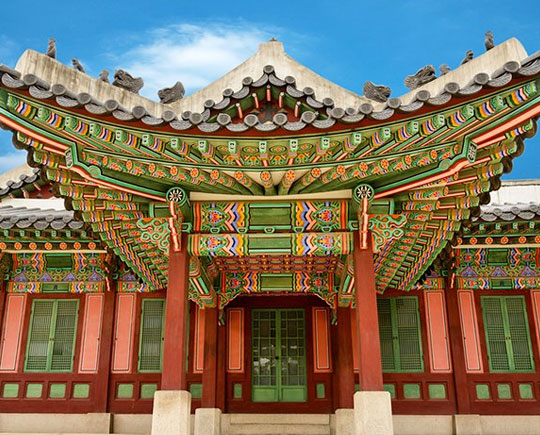South Korea (KR)

- Stay: Up to 90 days
- Visa: Not always needed
- Valid passport required
- No work allowed
- Apply online or at the embassy
1. Check Eligibility
- Ensure your nationality requires a visa to visit South Korea.
- Confirm you meet all the eligibility criteria.
2. Gather Required Documents
- Valid passport (with at least 6 months validity and blank pages).
- Completed visa application form (downloadable from the official embassy website).
- Passport-sized photo (recent, colored, and meeting embassy specifications).
- Proof of financial stability (bank statements, pay slips, etc.).
- Travel itinerary (flight bookings, accommodation details).
- Proof of employment or school enrollment.
- Visa fee payment receipt.
3. Fill Out the Application Form
- Download and print the visa application form.
- Fill out all sections accurately and legibly.
- Double-check for any errors or omissions.
4. Schedule an Appointment
- Visit the official website of the South Korean embassy or
Sure, here are the direct links to online tourist visa application portals for South Korea:
2. Korea Electronic Travel Authorization
These websites will guide you through the process of applying for a tourist visa to South Korea.
Sure! Here's a simple and clear list of documents needed for a visa application to South Korea:
1. Passport: Valid for at least 6 months beyond your stay.
2. Visa Application Form: Completed and signed.
3. Passport-sized Photos: Usually 2 recent photos.
4. Proof of Accommodation: Hotel booking or invitation letter from a host.
5. Travel Itinerary: Detailed plan of your trip, including flight tickets.
6. Financial Proof: Bank statements or proof of sufficient funds.
7. Employment Certificate: Letter from your employer or proof of business ownership.
8. Visa Fee Payment: Receipt or proof of payment.
9. Invitation Letter: If visiting friends or family, include their contact details.
10. Health Insurance: Proof of travel or health insurance covering your stay.
11. Criminal Record Check: If required, a police clearance certificate.
Sure! Here are the steps to extend your visa in South Korea:
1. Check Eligibility: Ensure your visa type allows for an extension. Tourist visas often cannot be extended, but student and work visas usually can.
2. Gather Documents: You'll need your passport, Alien Registration Card (if you have one), a completed application form, and any supporting documents (like a letter from your employer or school).
3. Visit Immigration Office: Go to a local immigration office. It's best to make an appointment online to avoid long waits.
4. Submit Application: Hand in your documents and application form. Be ready to explain why you need the extension.
5. Pay Fee: There is usually a fee for extending your visa. Make sure to have cash or a credit card ready.
6. Wait for Approval: Processing times can vary. You'll be notified once your extension is approved.
To enter South Korea, travelers must meet certain requirements:
1. Passport: Ensure your passport is valid for at least six months from your date of entry.
2. Visa: Depending on your nationality, you may need a visa. Some countries have visa-free arrangements for short stays.
3. Health Declaration: Complete a health declaration form upon arrival.
Always check the latest updates
When visiting South Korea, it's important to respect local laws and customs to ensure a smooth trip. Here are some key points to keep in mind:
1. Respect for Elders: Always show respect to older people. Bowing is a common way to greet and show respect.
2. Public Behavior: Avoid loud or boisterous behavior in public. South Koreans value modesty and politeness.
3. Dress Code: Dress modestly, especially when visiting temples or religious sites. Revealing clothing can be frowned upon.
4. Shoes Off Indoors: It's customary to remove your shoes before entering someone's home and some traditional accommodations.
5. No Tipping: Tipping is not a common practice in South Korea and can even be considered rude in some situations.
6. Smoking: Smoking is prohibited in many public places, including restaurants and bars. Look for designated smoking areas.
Sure! Here are some quick and interesting facts about South Korea:
1. Tech Hub: South Korea is one of the world's most technologically advanced countries and is home to major companies like Samsung and LG.
2. Internet Speed: It has some of the fastest internet speeds globally.
3. Pop Culture: K-pop and Korean dramas have a massive global following.
4. Cuisine: Famous for dishes like kimchi, bibimbap, and Korean BBQ.
5. Education: South Korea has a highly competitive education system.
6. Language: The official language is Korean, and the writing system is called Hangul.
7. Tradition Meets Modernity: The country beautifully blends ancient traditions with modern living.
8. Natural Beauty: Known for its scenic landscapes, including mountains and coastal areas.
9. Seoul: The capital, Seoul, is a bustling metropolis with a rich history.